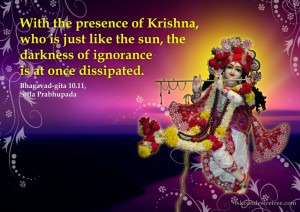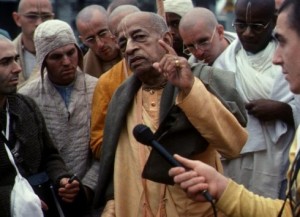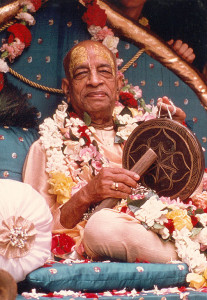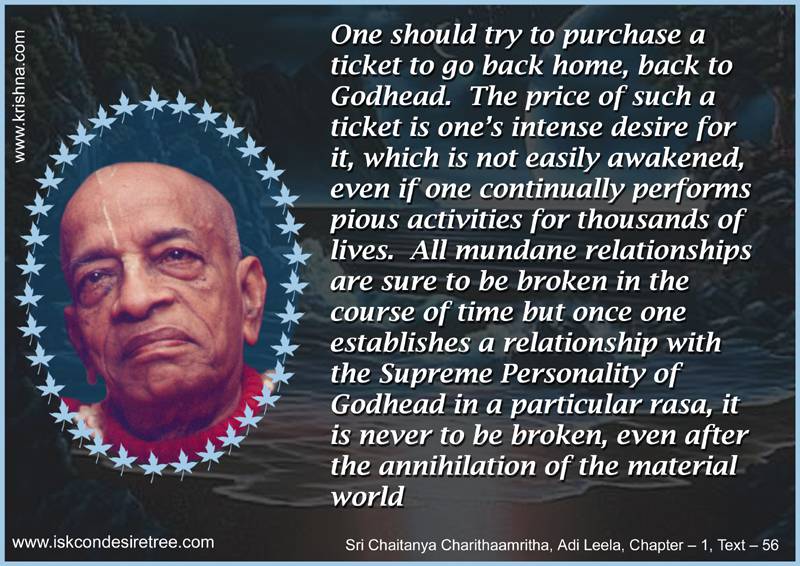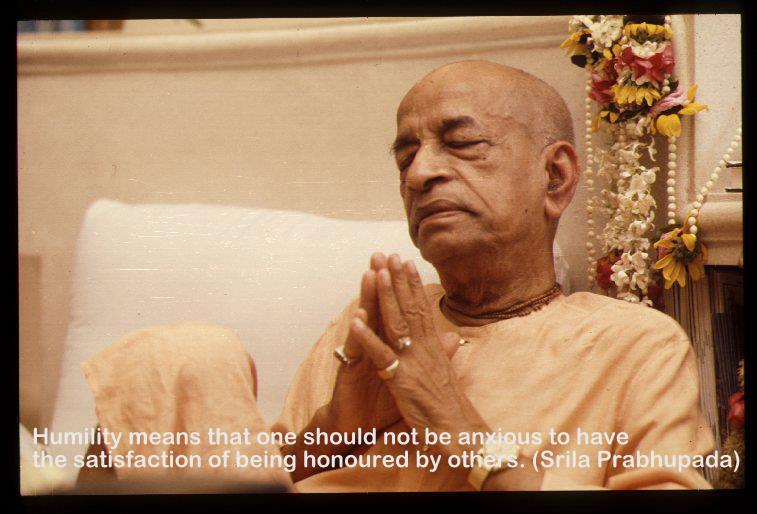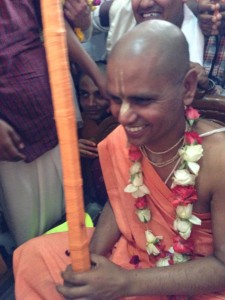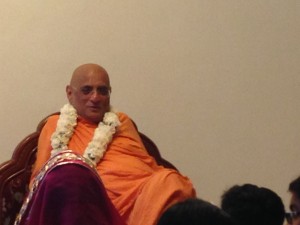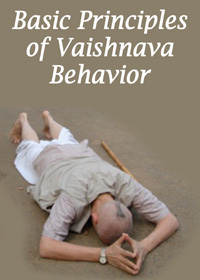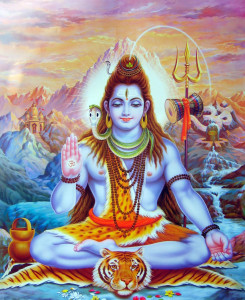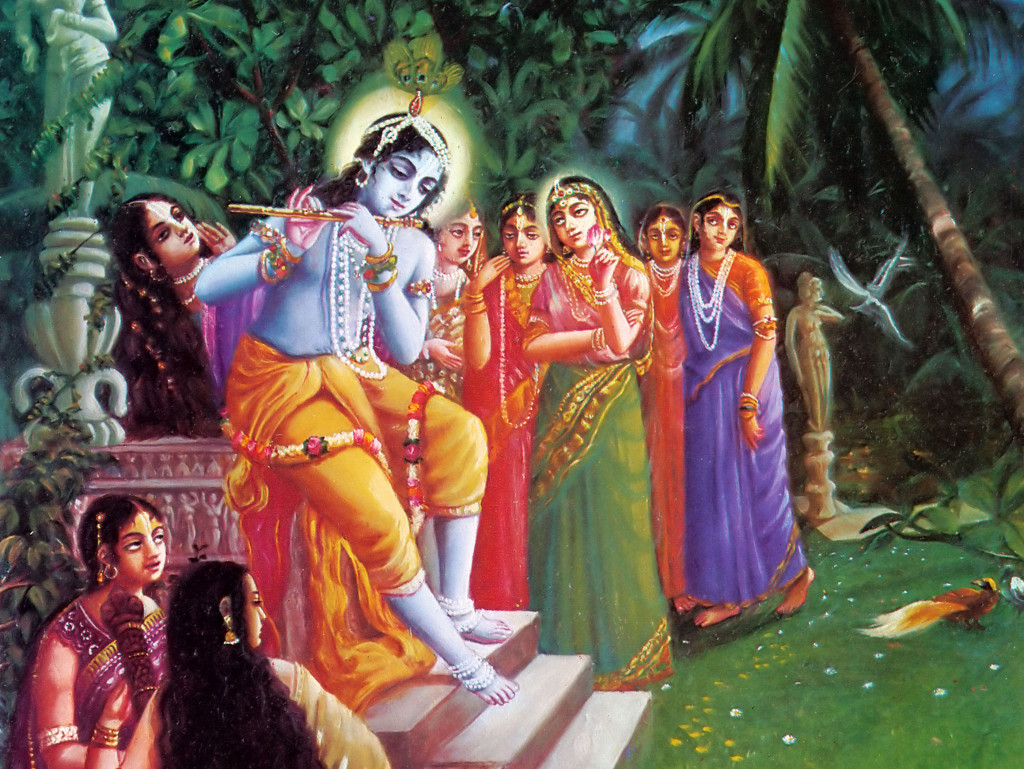Hare Krishna.
16th April, 2015. Gurgaon
Q: Can we do a 15 minutes yoga and achieve self realisation ?
Ans: Srimad Bhagavatam does not agree with it. Real yoga is very different.
The great sage Maitreya replied: Commanded by Lord Brahmā to beget children in the worlds, the worshipful Kardama Muni practiced penance on the bank of the River Sarasvatī for a period of ten thousand years. (SB 3.21.6)
Srila Prabhupada adds in his purport : It is understood herein that Kardama Muni meditated in yoga for ten thousand years before attaining perfection. Similarly, we have information that Vālmīki Muni also practiced yoga meditation for sixty thousand years before attaining perfection. Therefore, yoga practice can be successfully performed by persons who have a very long duration of life, such as one hundred thousand years; in that way it is possible to have perfection in yoga. Otherwise, there is no possibility of attaining the real perfection. Following the regulations, controlling the senses and practicing the different sitting postures are merely the preliminary practices. We do not know how people can be captivated by the bogus yoga system in which it is stated that simply by meditating fifteen minutes daily one can attain the perfection of becoming one with God. This age (Kali-yuga) is the age of bluffing and quarrel. Actually there is no possibility of attaining yoga perfection by such paltry proposals. The Vedic literature, for emphasis, clearly states three times that in this age of Kali — kalau nāsty eva nāsty eva nāsty eva — there is no other alternative, no other alternative, no other alternative than harer nāma [Adi 17.21], chanting the holy name of the Lord.
Q: Without devotion to Krishna can one be successful even in an indirect process like ashtanga yoga ?
Answer : Without devotion, not even an indirect process can be perfected.
During that period of penance, the sage Kardama, by worship through devotional service in trance, propitiated the Personality of Godhead, who is the quick bestower of all blessings upon those who flee to Him for protection. (SB 3.21.7)
Srila Prabhupada explains in his purport to the above verse: The significance of meditation is described here. Kardama Muni practiced mystic yoga meditation for ten thousand years just to please the Supreme Personality of Godhead, Hari. Therefore, whether one practices yoga or speculates and does research to find God, one’s efforts must be mixed with the process of devotion. Without devotion, nothing can be perfect. The target of perfection and realization is the Supreme Personality of Godhead. In the Sixth Chapter of Bhagavad-gītā it is clearly said that one who constantly engages in Kṛṣṇa consciousness is the topmost yogī. The Personality of Godhead, Hari, also fulfills the desires of His surrendered devotee. One has to surrender unto the lotus feet of the Personality of Godhead, Hari, or Krishna, in order to achieve real success. Devotional service, or engagement in Kṛṣṇa consciousness, is the direct method, and all other methods, although recommended, are indirect. In this age of Kali the direct method is especially more feasible than the indirect because people are short-living, their intelligence is poor, and they are poverty-stricken and embarrassed by so many miserable disturbances. Lord Caitanya, therefore, has given the greatest boon: in this age one simply has to chant the holy name of God to attain perfection in spiritual life.
Q: Why should we not seek material benefits from Lord ?
Ans: Srimad Bhagavatam says even those who are rotting in hell can attain them!
Your lotus feet are the true vessel to take one across the ocean of mundane nescience. Only persons deprived of their intelligence by the spell of the deluding energy will worship those feet with a view to attain the trivial and momentary pleasures of the senses, which even persons rotting in hell can attain. However, O my Lord, You are so kind that You bestow mercy even upon them. (SB 3.21.7)
Prabhupada expands it wonderfully in his purport : As stated in Bhagavad-gītā, Seventh Chapter, there are two kinds of devotees — those who desire material pleasures and those who desire nothing but service to the Lord. Material pleasures can be attained even by hogs and dogs, whose condition of life is hellish. The hog also eats, sleeps and enjoys sex life to the full extent, and it is also very satisfied with such hellish enjoyment of material existence. Modern yogīs advise that because one has senses, one must enjoy to the fullest extent like cats and dogs, yet one can go on and practice yoga. This is condemned here by Kardama Muni; he says that such material pleasures are available for cats and dogs in a hellish condition. The Lord is so kind that if so-called yogīs are satisfied by hellish pleasures, He can give them facilities to attain all the material pleasures they desire, but they cannot attain the perfectional stage attained by Kardama Muni.
…..Actually, the intelligent practitioner of yoga should aspire for nothing else but to cross over the ocean of nescience by worshiping the Personality of Godhead and to see the lotus feet of the Lord. The Lord is so kind, however, that even today persons whose brain substance is spoiled are given the benediction to become cats, dogs or hogs and enjoy material happiness from sex life and sense gratification. The Lord confirms this benediction in Bhagavad-gītā: “Whatever a person aspires to receive from Me, I offer him as he desires.”
Q: What could be the result of seeking material benefits?
Reply : We could be born in the lower species of life to fulfill them.
Srila Prabhupada warns the in his purport to SB 3.21.7 Hellish and demoniac persons do not actually know what is the ultimate attainment in perfection, and therefore they think that sense gratification is the highest goal of life. They advise that one can satisfy the senses and at the same time, by reciting some mantra and by some practice, can cheaply aspire for perfection. Such persons are described here as hata-medhasaḥ, which means “those whose brains are spoiled.” They aspire for material enjoyment by perfection of yoga or meditation. In Bhagavad-gītā it is stated by the Lord that the intelligence of those who worship the demigods has been spoiled. Similarly, here too it is stated by Kardama Muni that one who aspires after material enjoyment by practice of yoga has spoiled his brain substance and is fool number one. Actually, the intelligent practitioner of yoga should aspire for nothing else but to cross over the ocean of nescience by worshiping the Personality of Godhead and to see the lotus feet of the Lord. The Lord is so kind, however, that even today persons whose brain substance is spoiled are given the benediction to become cats, dogs or hogs and enjoy material happiness from sex life and sense gratification. The Lord confirms this benediction in Bhagavad-gītā: “Whatever a person aspires to receive from Me, I offer him as he desires.”
Q: Who can overcome time factor and how ?
Ans : A devotee can easily overcome time factor by surrendering to Lord Krishna.
Your wheel, which has three naves, rotates around the axis of the imperishable Brahman. It has thirteen spokes, 360 joints, six rims and numberless leaves carved upon it. Though its revolution cuts short the life-span of the entire creation, this wheel of tremendous velocity cannot touch the life-span of the devotees of the Lord. (SB 3.21.18)
Srila Prabhupada explains: The time factor cannot affect the span of life of the devotees. In Bhagavad-gītā it is stated that a little execution of devotional service saves one from the greatest danger. The greatest danger is transmigration of the soul from one body to another, and only devotional service to the Lord can stop this process. It is stated in the Vedic literatures, hariṁ vinā na sṛtiṁ taranti: without the mercy of the Lord, one cannot stop the cycle of birth and death. In Bhagavad-gītā it is stated that only by understanding the transcendental nature of the Lord and His activities, His appearance and disappearance, can one stop the cycle of death and go back to Him. The time factor is divided into many fractions of moments, hours, months, years, periods, seasons, etc. All the divisions in this verse are determined according to the astronomical calculations of Vedic literature. There are six seasons, called ṛtus, and there is the period of four months called cāturmāsya. Three periods of four months complete one year…. The time factor, however, cannot touch the lifespan of the devotees. In another verse it is stated that when the sun rises and sets it takes away the life of all living entities, but it cannot take away the life of those who are engaged in devotional service. Time is compared here to a big wheel which has 360 joints, six rims in the shape of seasons, and numberless leaves in the shape of moments. It rotates on the eternal existence, Brahman.
All glories to Srimad Bhagavatam.
All glories to Sri Guru and Gauranga.
All glories to Srila Prabhupada.


